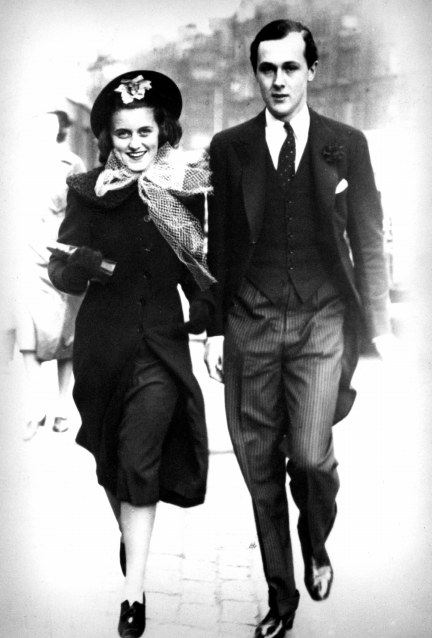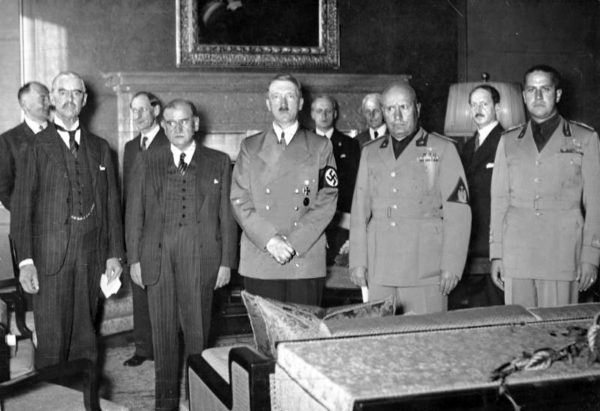by Barbara Leaming
Kick Kennedy: The Charmed Life and Tragic Death of the Favorite Kennedy Daughter
On the evening of September 21, 1938, Kick Kennedy found her assigned place in the dining room of the cream-colored castle, which had been used as a hunting lodge in the fourteenth century by Robert the Bruce, King of Scotland, and had been enlarged numerous times since. The dining room’s extensive windows overlooked what had come to be known as the American Garden, a reference to the ornate plantings that had been brought over from the U.S. Among the other young people who were just then finding their places at Lord Airlie’s dinner table on the occasion of his daughter Jean’s twentieth birthday dinner were her sister Maggot, Ivar Colquhoun, and Rene Haig.
When all were seated, two chairs remained conspicuously empty.
Billy Hartington and David Ormsby-Gore had been due to begin the long drive up early that morning. For most people, the trip would likely take about twelve hours. But with David at the wheel, it had been expected that the boys would require considerably less time.

COURTESY JOHN F. KENNEDY LIBRARY. Image taken from the book Kick Kennedy published by St Marketins Press
Which was just as well, for Jean perceived that Kick Kennedy had been keenly anticipating her reunion with Billy for far longer than merely the two days she had already been in residence. Indeed, Kick appeared to have regarded her time in the South of France as but a necessary interlude before their next encounter. She was a good deal thinner than when Jean or the others had last seen her, and she had acquired a mannerism of emphasizing her newly svelte waist by delightedly spanning it with both hands, a gesture she could not possibly have managed before. Kick Kennedy insisted that the substantial weight loss had been the consequence of its having been so warm in the South of France that she had had no appetite for weeks. Jean, who noticed that Kick seemed not to have regained her appetite at Cortachy, guessed that like countless young women in love before and since, she had in fact been dieting madly in anticipation of seeing her young man again.
So when that young man proved to be late in making his appearance, and worse, when Lord Airlie angrily decreed that the birthday festivities begin without Billy and David, Kick Kennedy was as distressed as Jean was embarrassed. Lady Airlie was the parent known to be gruff and difficult with her daughters, as well as with their friends. The curly-haired, colorfully kilted Lord Airlie tended to be good-humored, and was much beloved by the young people in the cousinhood. Yet when, partway through the meal, the butler came in to inform Lord Airlie that the missing guests had arrived at last, he was instructed to tell Billy and David that they were too late for dinner, then show them to their rooms. These orders notwithstanding, the butler later brought up plenty of food for both young travelers, at Kick Kennedy’s and Jean’s frantically whispered behest. As the girls understood, Lord Airlie’s wrath was less a reflection of any rigid insistence on his part upon promptness or proper attire than of how affected he was by the terrible tension of the moment, the British government having been engaged in days of discussion and debate about Hitler’s demands at the Fuehrer’s meeting with Chamberlain at Berchtesgaden.
Unlike Joe Kennedy, who, to the horror of certain of his Harvard classmates, had managed to evade military service in the last war, Joe Airlie had fought bravely in the trenches. He bore the scar of a wound to his leg, and he had been awarded the high honor of a Military Cross. Joe Kennedy wanted Britain to come to terms with Hitler because, among other reasons, he feared another war might wipe out his personal fortune and impede his plans for assuring the political futures of his eldest sons, particularly of young Joe. In any case, Ambassador Kennedy did not think the decadent, depleted British capable of fighting, let alone winning, a new military conflict with the Germans. As always with Joe Kennedy, matters of honor and principle were simply not factors in his calculations.
Joe Airlie, though he too supported the policy of appeasement, was another matter altogether. He was acutely sensitive to the questions of honor and duty raised by the Czech crisis. He had met Hitler and— unlike some aristocrats who professed to admire the Fuehrer—he found the German’s policies and politics abhorrent. Nonetheless, as one who had personally endured the agony of the last war, he could not bear the prospect of that agony being visited upon the next generation. Lord Airlie’s fit of temper when Billy and David arrived late expressed his monumental upset at the prospect that these two childishly undisciplined young men, as he viewed them, might soon be leaving a Scottish shoot- ing party, where grouse were the targets, for the fields of death where they themselves would provide targets for the Germans.
While Jean’s father reacted to the prevailing anxiety with irascibility, Kick Kennedy responded by striving to concentrate on the pleasures of the moment now that she and Billy had been reunited at last. To watch them together that week—as Kick Kennedy sat directly behind Billy while he shot grouse each afternoon; as she and he enjoyed noontime picnics and moonlight walks on the moors; as, dressed in evening clothes, they danced to records played on Jean’s old windup gramophone—was to ob- serve a young couple who were unmistakably in love.
To Kick Kennedy’s dismay, however, it was impossible to shut out the dramatic international developments that were threatening to snatch Billy away from her at the very moment when she and he were really just discovering each other. She who had previously enchanted the boys of the aristocratic cousinhood by her readiness to listen to their animated talk of politics and world affairs was suddenly and conspicuously a good deal less than enthusiastic about those topics.
On Friday, the twenty-third of September, Kick Kennedy wrote to Jack’s friend Lem Billings in America: “All you can hear or talk about at this point is the future war which is bound to come. Am so darn sick of it.” At the time she voiced that sentiment, Chamberlain had returned for a second round of discussions with Hitler, this time in the Rhineland town of Bad Godesberg. Again, the Fuehrer drastically augmented his demands. He stipulated that if the Czechs failed to vacate the Sudetenland by September 28, German troops would march into the disputed territories on the first of the month. Though in Bad Godesberg he had objected to Hitler’s terms, Chamberlain, when he returned to London, urged his cabinet to accept them.

Lord Airlie, meanwhile, persisted in going out every morning with the boys to shoot, a voluminous plaid wrapped round his broad shoulders against the chill. On one occasion during this nerve-jangling period, the older man snapped when the fellows began to pepper one another with shotgun pellets. Immediately he ordered all of them into the cars and back to the castle. “You are all dangerous and you are coming home!” Lord Airlie shouted, saddened, as he was later heard to grumble, that these young fools might soon find themselves on an actual battlefield for which they were in no way prepared.
On Sunday the twenty-fifth of September, the day after Chamberlain returned to London with Hitler’s ultimatum, the young people at Cortachy drove some eight miles to Airlie Castle, the home of Jean’s grandmother, the Dowager Countess of Airlie, who was a sister of Lady Alice Salisbury. Accompanying them now were Robert Cecil and Debo Mitford, who had joined the party in the meantime, and whose presence in the group highlighted how very divided the country in general, and the upper class in particular, remained with regard to the policy of appeasement.
Barbara Leaming is the author of three New York Times bestsellers, including her most recent book Kick Kennedy: The Charmed Life and Tragic Death of the Favorite Kennedy Daughter. Leaming’s previous book Churchill Defiant received The Emery Reves Award from the International Churchill Centre. Her groundbreaking biography of America’s thirty-fifth president, Jack Kennedy: The Education of a Statesman was the first to detail the lifelong influence of British history and culture and especially of Winston Churchill on JFK. Her articles have appeared in The New York Times Magazine, Vanity Fair, the Times of London and other publications. She lives in Connecticut.
